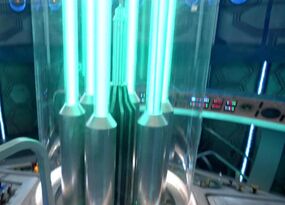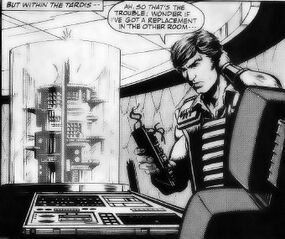Time rotor: Difference between revisions
Tags: Mobile edit Mobile web edit |
|||
| Line 49: | Line 49: | ||
=== Secondary console room === | === Secondary console room === | ||
The console in [[TARDIS console room#Secondary control room|the TARDIS' secondary console room]] lacked a visible time rotor; in its place on the secondary console was a shaving mirror. ([[TV]]: ''[[The Masque of Mandragora (TV story)|The Masque of Mandragora]]'') | The console in [[TARDIS console room#Secondary control room|the TARDIS' secondary console room]] lacked a visible time rotor; in its place on the secondary console was a shaving mirror. ([[TV]]: ''[[The Masque of Mandragora (TV story)|The Masque of Mandragora]]'') | ||
Revision as of 15:11, 16 July 2024
- You may be looking for time motor.
The time rotor, sometimes called the time column, (TV: Logopolis) central column, (AUDIO: The Kamelion Empire) control column, (AUDIO: Absolution) main control column (COMIC: Who's That Girl!) or time control core, (COMIC: The Secrets of the Tardis) was a component in the central column of a TARDIS' control console. While a TARDIS was in flight, the rotor rose and fell, stopping when the TARDIS reached a destination. It was associated with the 'whooshing' noise heard when the TARDIS was in flight.
The time rotor was connected to the lower engines; hence as the TARDIS moved the rotor moved accordingly. As well as signifying the TARDIS' movement, the rotor was also known to stop working when something went wrong, e.g. the rotor stopped moving as the TARDIS engines stalled. This might be rectified by thumping the console. (TV: Doctor Who)
If the glass protecting the time rotor was damaged, such as when Mels shot it, a poisonous gas would come out of it until the extractor fans were activated. (TV: Let's Kill Hitler)
The Doctor's TARDIS
As with the rest of the Doctor's TARDIS, the aesthetic design of the time rotor occasionally changed throughout the Doctor's travels. As it varied through designs, it alternated between being a single column and a series of components that moved into each other from above and below.
From the start it took the shape of a short, transparent cylinder containing an assortment of components, which rose and fell, with the components circling and rotating within. (TV: An Unearthly Child, et al.)
The Third Doctor's new control console featured a new time rotor with three green inner tubes and a central red one. (TV: The Claws of Axos) At one point durng his attempts to get the TARDIS working the Doctor removed the casing around the rotor and took to using it as a bin. It was replaced by the Master when he briefly possessed the Doctor's body. (PROSE: The Switching)
Some time during his travels with Sarah Jane Smith, the Fourth Doctor's time rotor had its green inner tubes replaced with red ones. (TV: Planet of Evil) He occasionally placed his hat atop of it. (TV: The Stones of Blood, The Horns of Nimon)
The Fifth Doctor caused the console to self-destruct to keep Chaos from using it, shattering the central column. (AUDIO: The Kamelion Empire) He soon gained a new console with a new time rotor. (TV: The Five Doctors)
At one point during the Sixth Doctor's travels, a Whifferdill named Frobisher assumed the form of the time rotor. (COMIC: The Shape Shifter)
After the TARDIS console was once again reconfigured due to the Doctor's signet ring interfacing with the chameleon circuit icon system, the time rotor became a cross between its previous design and its original. (COMIC: The Chameleon Factor)
By the time the Seventh Doctor was travelling alone, there was a powerful electromagnet built into the main control column, which could be manipulated by buttons on the console. He reversed its polarity while bound to the console with magnetic clamps by Kasgi; this caused the magnet to repel the clamps, freeing the Doctor. (COMIC: Who's That Girl!)
Some time during the Seventh Doctor's life, the TARDIS console room and console were reconfigured once again. In this design, the time rotor was a tall, transparent tube which attached to the ceiling as well as the console. Inside were a pair of glowing, opaque, blue-white tube assemblies which would rise and fall in alternation during flight, meshing and unmeshing in the centre. (TV: Doctor Who)
The War, Ninth and Tenth Doctors' time rotor also reached the ceiling, and contained a set of glowing, transparent inner assembly of tubes, which glowed both white (TV: The Day of the Doctor) and later turquoise. (TV: Rose)
When that console room was destroyed and a new one regenerated by the TARDIS, the Eleventh Doctor was greeted by a time rotor which contained transparent, bulbous inner components resembling blown glass. (TV: The Eleventh Hour)
After the Doctor became seclusive following the departure of the Ponds, the TARDIS interior regenerated once again. Because of this change, a new console room and console were introduced, and with them a new time rotor, composed of a hexagonal array of neon turquoise tubes that connected the ceiling to the console (as in previous incarnations). Though while in contrast the newer rotor appeared to be fixed, lights inside the tubes rhythmically flashed in sequence when in flight, simulating the 'pumping' motion of the temporal piston. There were also two small crystal-like prisms in the top and bottom centres of the time rotor that physically pumped up and down. (TV: The Snowmen) Once he had regenerated, the Twelfth Doctor changed the colouring of the turquoise pipes in the time rotor to a warmer orange. (TV: Deep Breath)
After the TARDIS malfunctioned following the Twelfth Doctor's regeneration, it chose a new console room to replace which had sustained damage. In this latest iteration of the interior, the time rotor appeared as a giant crystal that coincidentally looked similar to the emitter of the Thirteenth Doctor's sonic screwdriver. (TV: The Ghost Monument) Notably, the time rotor did not reach up to the ceiling and instead undulated independently, in the traditional manner of earlier TARDIS designs. (TV: Rosa)
The column did still however seem to have some sort of wireless connection to the roof, as a second such crystal hung upside down directly above it, though unattached. (TV: Spyfall)
Secondary console room
The console in the TARDIS' secondary console room lacked a visible time rotor; in its place on the secondary console was a shaving mirror. (TV: The Masque of Mandragora)
Other TARDISes
Lord Kairel's TARDIS had a different rotor than the Doctor's. (COMIC: The Stolen TARDIS)
The design of time rotor and console of the Master's TARDIS tended to be similar to the Doctor's. (TV: Colony in Space, Planet of Fire, The Ultimate Foe) The same was also true for the Monk's TARDIS. (TV: "Checkmate")
The Master also used a unique type of rotor at one point. (TV: The Time Monster)
The time rotor in the Rani's TARDIS was a pair of bare, rotating, metallic rings rather than a cylinder. (TV: The Mark of the Rani)
The Junk TARDIS built by the Eleventh Doctor and Idris featured a short time rotor salvaged from a dead TARDIS, plugged into a similarly salvaged console. It contained lights and metal components. It glowed pink when activated with a touch by Idris. (TV: The Doctor's Wife)
Other references
Chris Cwej, when recounting a meeting with Iris Wildthyme, said that he felt "the hackles rise like a time rotor on the back of [his] neck" when she mentioned their common acquaintanceship with the Evil Renegade. (PROSE: Flickering Flame)




